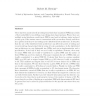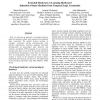77 search results - page 4 / 16 » Finite State Machine Decomposition For Low Power |
TCS
2010
13 years 5 months ago
2010
There has been much interest in testing from finite state machines (FSMs) as a result of their suitability for modelling or specifying state-based systems. Where there are multip...
EH
1999
IEEE
1999
IEEE
Evolvable Hardware or Learning Hardware? Induction of State Machines from Temporal Logic Constraints
13 years 11 months ago
Here we advocate an approach to learning hardware based on induction of finite state machines from temporal logic constraints. The method involves training on examples, constraint...
ICVGIP
2004
13 years 8 months ago
2004
In this paper we present a simple framework for activity recognition based on a model of multi-layered finite state machines, built on top of a low level image processing module f...
COLT
1992
Springer
13 years 11 months ago
1992
Springer
This paper deals with finite size networks which consist of interconnections of synchronously evolving processors. Each processor updates its state by applying a "sigmoidal&q...
ISLPED
1998
ACM
13 years 11 months ago
1998
ACM
- The objective of this paper is to provide lower and upper bounds for the switching activity on the state lines in Finite State Machines (FSMs). Using a Markov chain model for the...


